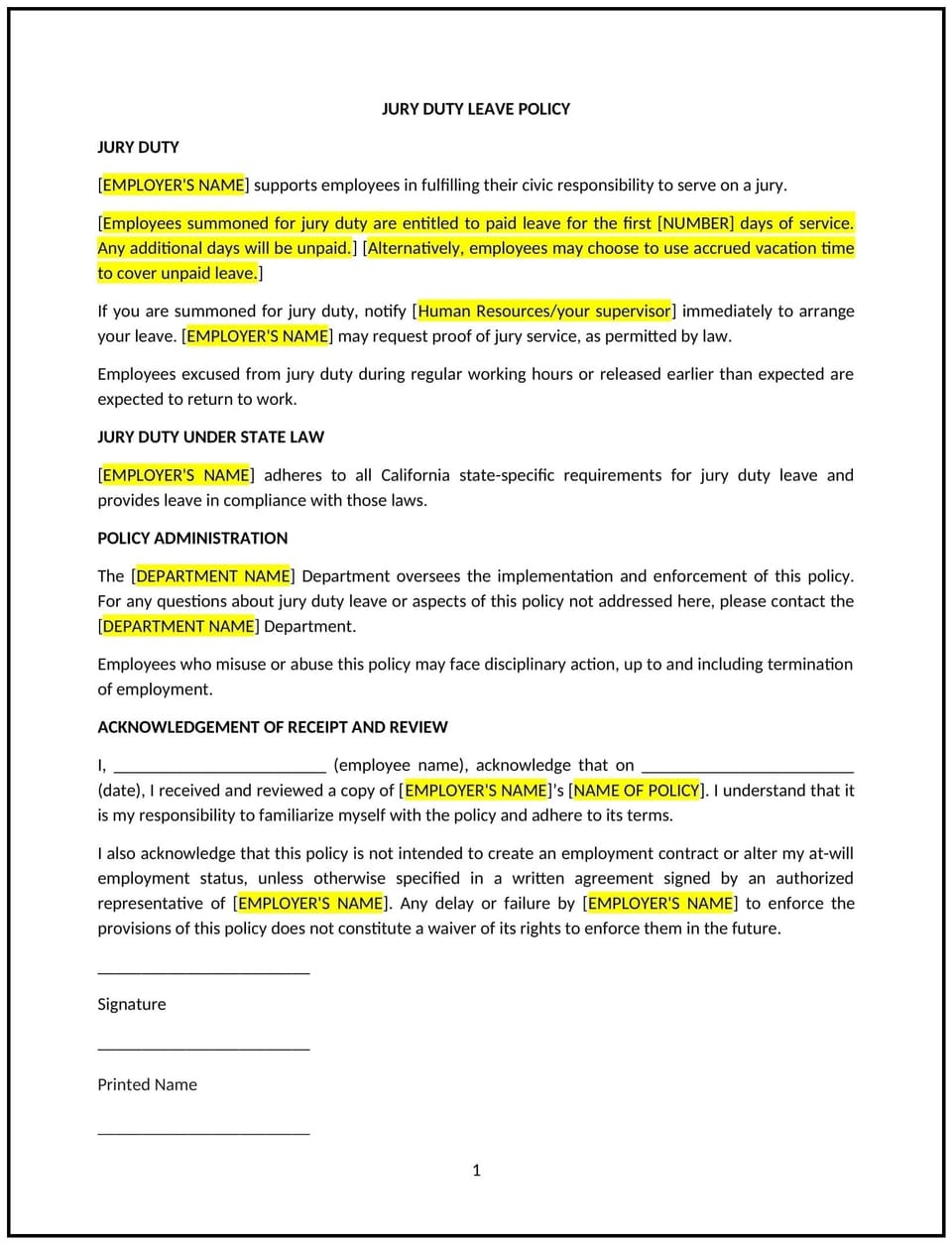Jury duty leave policy (California): Free template

Jury duty leave policy (California)
In California, a jury duty leave policy provides businesses with guidelines for granting employees time off to fulfill their civic duty as jurors. This policy supports compliance with California Labor Code Section 230, which prohibits employers from discriminating or retaliating against employees serving on a jury.
This policy outlines eligibility, procedures for requesting leave, and the business’s expectations for employees during their jury service. By implementing this policy, California businesses can demonstrate civic responsibility and ensure a fair and consistent approach to managing jury duty leave.
How to use this jury duty leave policy (California)
- Define eligibility: Specify that all employees summoned for jury duty are eligible for leave, as required under California law.
- Outline notice requirements: Provide instructions for employees to notify their manager or HR of jury duty summons as soon as possible.
- Address pay: State whether the business provides paid or unpaid jury duty leave, reflecting the business’s policy and any applicable agreements.
- Communicate expectations: Clarify that employees are expected to return to work promptly when not required to be in court during regular work hours.
- Retain documentation: Require employees to submit proof of jury service, such as a summons or attendance confirmation from the court.
Benefits of using this jury duty leave policy (California)
This policy offers several advantages for California businesses:
- Supports compliance: Reflects California Labor Code requirements, ensuring lawful management of jury duty leave.
- Promotes fairness: Provides consistent guidelines for all employees summoned for jury duty.
- Enhances morale: Demonstrates the business’s respect for employees’ civic responsibilities.
- Reduces disputes: Clarifies expectations for leave and documentation, minimizing misunderstandings.
- Encourages accountability: Ensures employees and the business adhere to legal and procedural requirements.
Tips for using this jury duty leave policy (California)
- Reflect California-specific laws: Ensure the policy aligns with Labor Code Section 230 and any additional local requirements.
- Communicate clearly: Provide employees with easy-to-understand guidelines for requesting and documenting jury duty leave.
- Train managers: Educate supervisors on handling jury duty leave requests fairly and in compliance with the law.
- Consider compensation: If offering paid jury duty leave, clearly define the terms, such as duration and pay rates.
- Review regularly: Update the policy to reflect changes in California laws or business practices.
Q: How does this policy benefit the business?
A: This policy supports compliance with California laws, ensures consistent handling of jury duty leave, and demonstrates the business’s commitment to civic duties.
Q: Are employees paid during jury duty leave under this policy?
A: Whether jury duty leave is paid or unpaid depends on the business’s policy. California law does not require paid leave, but the business may choose to offer compensation.
Q: How does this policy support compliance with California laws?
A: The policy reflects California Labor Code Section 230, ensuring employees are granted leave and protected from retaliation for serving on a jury.
Q: What steps should employees take to request jury duty leave?
A: Employees should notify their manager or HR as soon as they receive a summons and provide proof of jury service, such as a court-issued document.
Q: How can the business manage workloads during an employee’s jury duty leave?
A: The business can reassign tasks, adjust schedules, or hire temporary support to maintain productivity during the employee’s absence.
This article contains general legal information and does not contain legal advice. Cobrief is not a law firm or a substitute for an attorney or law firm. The law is complex and changes often. For legal advice, please ask a lawyer.


